- Home
- Virginia Woolf
To The Lighthouse Page 13
To The Lighthouse Read online
Page 13
about making jokes, as now, not being able to decide whether they were
going into the smoking-room, into the drawing-room, up to the attics.
Then one saw Mrs Ramsay in the midst of this hubbub standing there with
Minta's arm in hers, bethink her, "Yes, it is time for that now," and
so make off at once with an air of secrecy to do something alone. And
directly she went a sort of disintegration set in; they wavered about,
went different ways, Mr Bankes took Charles Tansley by the arm and went
off to finish on the terrace the discussion they had begun at dinner
about politics, thus giving a turn to the whole poise of the evening,
making the weight fall in a different direction, as if, Lily thought,
seeing them go, and hearing a word or two about the policy of the
Labour Party, they had gone up on to the bridge of the ship and were
taking their bearings; the change from poetry to politics struck her
like that; so Mr Bankes and Charles Mrs Ramsay going upstairs in the
lamplight alone. Where, Lily wondered, was she going so quickly?
Not that she did in fact run or hurry; she went indeed rather slowly.
She felt rather inclined just for a moment to stand still after all
that chatter, and pick out one particular thing; the thing that
mattered; to detach it; separate it off; clean it of all the emotions
and odds and ends of things, and so hold it before her, and bring it to
the tribunal where, ranged about in conclave, sat the judges she had
set up to decide these things. Is it good, is it bad, is it right or
wrong? Where are we all going to? and so on. So she righted
herself after the shock of the event, and quite unconsciously and
incongruously, used the branches of the elm trees outside to help her
to stabilise her position. Her world was changing: they were still.
The event had given her a sense of movement. All must be in order.
She must get that right and that right, she thought, insensibly
approving of the dignity of the trees' stillness, and now again of the
superb upward rise (like the beak of a ship up a wave) of the elm
branches as the wind raised them. For it was windy (she stood a moment
to look out). It was windy, so that the leaves now and then brushed
open a star, and the stars themselves seemed to be shaking and darting
light and trying to flash out between the edges of the leaves. Yes,
that was done then, accomplished; and as with all things done, became
solemn. Now one thought of it, cleared of chatter and emotion, it
seemed always to have been, only was shown now and so being shown,
struck everything into stability. They would, she thought, going on
again, however long they lived, come back to this night; this moon;
this wind; this house: and to her too. It flattered her, where she was
most susceptible of flattery, to think how, wound about in their
hearts, however long they lived she would be woven; and this, and this,
and this, she thought, going upstairs, laughing, but affectionately, at
the sofa on the landing (her mother's); at the rocking-chair (her
father's); at the map of the Hebrides. All that would be revived again
in the lives of Paul and Minta; "the Rayleys"--she tried the new name
over; and she felt, with her hand on the nursery door, that community
of feeling with other people which emotion gives as if the walls of
partition had become so thin that practically (the feeling was one of
relief and happiness) it was all one stream, and chairs, tables, maps,
were hers, were theirs, it did not matter whose, and Paul and Minta
would carry it on when she was dead.
She turned the handle, firmly, lest it should squeak, and went in,
pursing her lips slightly, as if to remind herself that she must not
speak aloud. But directly she came in she saw, with annoyance, that the
precaution was not needed. The children were not asleep. It was most
annoying. Mildred should be more careful. There was James wide awake
and Cam sitting bolt upright, and Mildred out of bed in her bare feet,
and it was almost eleven and they were all talking. What was the
matter? It was that horrid skull again. She had told Mildred to move
it, but Mildred, of course, had forgotten, and now there was Cam wide
awake, and James wide awake quarreling when they ought to have been
asleep hours ago. What had possessed Edward to send them this horrid
skull? She had been so foolish as to let them nail it up there. It
was nailed fast, Mildred said, and Cam couldn't go to sleep with it in
the room, and James screamed if she touched it.
Then Cam must go to sleep (it had great horns said Cam)--must go to
sleep and dream of lovely bed by her side. She could see the horns,
Cam said, all over the room. It was true. Wherever they put the light
(and James could not sleep without a light) there was always a shadow
somewhere.
"But think, Cam, it's only an old pig," said Mrs Ramsay, "a nice black
pig like the pigs at the farm." But Cam thought it was a horrid thing,
branching at her all over the room.
"Well then," said Mrs Ramsay, "we will cover it up," and they all
watched her go to the chest of drawers, and open the little drawers
quickly one after another, and not seeing anything that would do, she
quickly took her own shawl off and wound it round the skull, round and
round and round, and then she came back to Cam and laid her head almost
flat on the pillow beside Cam's and said how lovely it looked now; how
the fairies would love it; it was like a bird's nest; it was like a
beautiful mountain such as she had seen abroad, with valleys and
flowers and bells ringing and birds singing and little goats and
antelopes and... She could see the words echoing as she spoke them
rhythmically in Cam's mind, and Cam was repeating after her how it was
like a mountain, a bird's nest, a garden, and there were little
antelopes, and her eyes were opening and shutting, and Mrs Ramsay went
on speaking still more monotonously, and more rhythmically and more
nonsensically, how she must shut her eyes and go to sleep and dream of
mountains and valleys and stars falling and parrots and antelopes and
gardens, and everything lovely, she said, raising her head very slowly
and speaking more and more mechanically, until she sat upright and saw
that Cam was asleep.
Now, she whispered, crossing over to his bed, James must go to sleep
too, for see, she said, the boar's skull was still there; they had not
touched it; quite unhurt. He made sure that the skull was still there
under the shawl. But he wanted to ask her something more. Would they
go to the Lighthouse tomorrow?
No, not tomorrow, she said, but soon, she promised him; the next fine
day. He was very good. He lay down. She covered him up. But he
would never forget, she knew, and she felt angry with Charles Tansley,
with her husband, and with herself, for she had raised his hopes. Then
feeling for her shawl and remembering that she had wrapped it round the
boar's skull, she got up, and pulled the window down another inch or
two, and heard the wind, and got a breath of the perfectly indifferent
chill night air and murmured good night to Mildred and left the room
and let the tongue of the door slowly lengthen in the lock and went
out.
She hoped he would not bang his books on the floor above their heads,
she thought, still thinking how annoying Charles Tansley was. For
neither of them slept well; they were excitable children, and since he
said things like that about the Lighthouse, it seemed to her likely
that he would knock a pile of books over, just as they were going to
sleep, clumsily sweeping them off the table with his elbow. For she
supposed that he had gone upstairs to work. Yet he looked so desolate;
yet she would feel relieved when he went; yet she would see that he was
better treated tomorrow; yet he was admirable with her husband; yet his
manners certainly wanted improving; yet she liked his laugh--thinking
this, as she came downstairs, she noticed that she could now see the
moon itself through the staircase window--the yellow harvest moon--
and turned, and they saw her, standing above them on the stairs.
"That's my mother," thought Prue. Yes; Minta should look at her; Paul
Rayley should look at her. That is the thing itself, she felt, as if
there were only one person like that in the world; her mother. And,
from having been quite grown up, a moment before, talking with the
others, she became a child again, and what they had been doing was a
game, and would her mother sanction their game, or condemn it, she
wondered. And thinking what a chance it was for Minta and Paul and
Lily to see her, and feeling what an extraordinary stroke of fortune it
was for her, to have her, and how she would never grow up and never
leave home, she said, like a child, "We thought of going down to the
beach to watch the waves."
Instantly, for no reason at all, Mrs Ramsay became like a girl of
twenty, full of gaiety. A mood of revelry suddenly took possession of
her. Of course they must go; of course they must go, she cried,
laughing; and running down the last three or four steps quickly, she
began turning from one to the other and laughing and drawing Minta's
wrap round her and saying she only wished she could come too, and would
they be very late, and had any of them got a watch?
"Yes, Paul has," said Minta. Paul slipped a beautiful gold watch out
of a little wash-leather case to show her. And as he held it in the
palm of his hand before her, he felt, "She knows all about it. I need
not say anything." He was saying to her as he showed her the watch,
"I've done it, Mrs Ramsay. I owe it all to you." And seeing the gold
watch lying in his hand, Mrs Ramsay felt, How extraordinarily lucky
Minta is! She is marrying a man who has a gold watch in a wash-
leather bag!
"How I wish I could come with you!" she cried. But she was withheld by
something so strong that she never even thought of asking herself what
it was. Of course it was impossible for her to go with them. But she
would have liked to go, had it not of her thought (how lucky to marry a
man with a wash-leather bag for his watch) she went with a smile on
her lips into the other room, where her husband sat reading.
19
Of course, she said to herself, coming into the room, she had to come
here to get something she wanted. First she wanted to sit down in a
particular chair under a particular lamp. But she wanted something
more, though she did not know, could not think what it was that she
wanted. She looked at her husband (taking up her stocking and
beginning to knit), and saw that he did not want to be interrupted--
that was clear. He was reading something that moved him very much. He
was half smiling and then she knew he was controlling his emotion. He
was tossing the pages over. He was acting it--perhaps he was
thinking himself the person in the book. She wondered what book it was.
Oh, it was one of old Sir Walter's she saw, adjusting the shade of her
lamp so that the light fell on her knitting. For Charles Tansley had
been saying (she looked up as if she expected to hear the crash of
books on the floor above), had been saying that people don't read Scott
any more. Then her husband thought, "That's what they'll say of me;"
so he went and got one of those books. And if he came to the
conclusion "That's true" what Charles Tansley said, he would accept it
about Scott. (She could see that he was weighing, considering, putting
this with that as he read.) But not about himself. He was always
uneasy about himself. That troubled her. He would always be worrying
about his own books--will they be read, are they good, why aren't they
better, what do people think of me? Not liking to think of him so,
and wondering if they had guessed at dinner why he suddenly became
irritable when they talked about fame and books lasting, wondering if
the children were laughing at that, she twitched the stockings out, and
all the fine gravings came drawn with steel instruments about her lips
and forehead, and she grew still like a tree which has been tossing and
quivering and now, when the breeze falls, settles, leaf by leaf, into
quiet.
It didn't matter, any of it, she thought. A great man, a great book,
fame--who could tell? She knew nothing about it. But it was his way
with him, his truthfulness--for instance at dinner she had been
thinking quite instinctively, If only he would speak! She had complete
trust in him. And dismissing all this, as one passes in diving now a
weed, now a straw, now a bubble, she felt again, sinking deeper, as she
had felt in the hall when the others were talking, There is something I
want--something I have come to get, and she fell deeper and deeper
without knowing quite what it was, with her eyes closed. And she
waited a little, knitting, wondering, and slowly rose those words they
had said at dinner, "the China rose is all abloom and buzzing with the
honey bee," began washing from side to side of her mind rhythmically,
and as they washed, words, like little shaded lights, one red, one
blue, one yellow, lit up in the dark of her mind, and seemed leaving
their perches up there to fly across and across, or to cry out and to
be echoed; so she turned and felt on the table beside her for a book.
And all the lives we ever lived
And all the lives to be,
Are full of trees and changing leaves,
she murmured, sticking her needles into the stocking. And she opened
the book and began reading here and there at random, and as she did so,
she felt that she was climbing backwards, upwards, shoving her way up
under petals that curved over her, so that she only knew this is white,
or this is red. She did not know at first what the words meant at all.
Steer, hither steer your winged pines, all beaten Mariners
she read and turned the page, swinging herself, zigzagging this way and
that, from one line to another as from one branch to another, from one
red and white flower to another, until a little sound roused her--her
husband slapping his thighs. Their eyes met for a second; but they did
not wan
t to speak to each other. They had nothing to say, but
something seemed, nevertheless, to go from him to her. It was the
life, it was the power of it, it was the tremendous humour, she knew,
that made him slap his thighs. Don't interrupt me, he seemed to be
saying, don't say anything; just sit there. And he went on reading.
His lips twitched. It filled him. It fortified him. He clean forgot
all the little rubs and digs of the evening, and how it bored him
unutterably to sit still while people ate and drank interminably, and
his being so irritable with his wife and so touchy and minding when
they passed his books over as if they didn't exist at all. But now, he
felt, it didn't matter a damn who reached Z (if thought ran like an
alphabet from A to Z). Somebody would reach it--if not he, then
another. This man's strength and sanity, his feeling for straight
forward simple things, these fishermen, the poor old crazed creature in
Mucklebackit's cottage made him feel so vigorous, so relieved of
something that he felt roused and triumphant and could not choke back
his tears. Raising the book a little to hide his face, he let them
fall and shook his head from side to side and forgot himself completely
(but not one or two reflections about morality and French novels and
English novels and Scott's hands being tied but his view perhaps being
as true as the other view), forgot his own bothers and failures
completely in poor Steenie's drowning and Mucklebackit's sorrow (that
was Scott at his best) and the astonishing delight and feeling of
vigour that it gave him.
Well, let them improve upon that, he thought as he finished the
chapter. He felt that he had been arguing with somebody, and had got
the better of him. They could not improve upon that, whatever they
might say; and his own position became more secure. The lovers were
fiddlesticks, he thought, collecting it all in his mind again. That's
fiddlesticks, that's first-rate, he thought, putting one thing beside
another. But he must read it again. He could not remember the whole
shape of the thing. He had to keep his judgement in suspense. So he
returned to the other thought--if young men did not care for this,
naturally they did not care for him either. One ought not to complain,
thought Mr Ramsay, trying to stifle his desire to complain to his wife
that young men did not admire him. But he was determined; he would not
bother her again. Here he looked at her reading. She looked very
peaceful, reading. He liked to think that every one had taken
themselves off and that he and she were alone. The whole of life did
not consist in going to bed with a woman, he thought, returning to
Scott and Balzac, to the English novel and the French novel.
Mrs Ramsay raised her head and like a person in a light sleep seemed to
say that if he wanted her to wake she would, she really would, but
otherwise, might she go on sleeping, just a little longer, just a
little longer? She was climbing up those branches, this way and that,
laying hands on one flower and then another.
"Nor praise the deep vermilion in the rose,"
she read, and so reading she was ascending, she felt, on to the top,
on to the summit. How satisfying! How restful! All the odds and ends
of the day stuck to this magnet; her mind felt swept, felt clean. And
then there it was, suddenly entire; she held it in her hands, beautiful
and reasonable, clear and complete, here--the sonnet.
But she was becoming conscious of her husband looking at her. He was
smiling at her, quizzically, as if he were ridiculing her gently for
being asleep in broad daylight, but at the same time he was thinking,
Go on reading. You don't look sad now, he thought. And he wondered
what she was reading, and exaggerated her ignorance, her simplicity,
for he liked to think that she was not clever, not book-learned at all.
He wondered if she understood what she was reading. Probably not, he

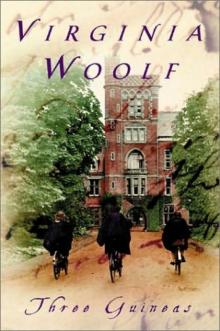 Three Guineas
Three Guineas Flush
Flush Mrs. Dalloway
Mrs. Dalloway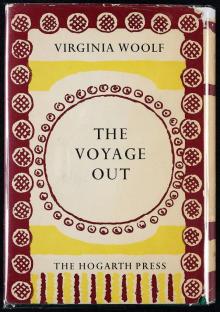 The Voyage Out
The Voyage Out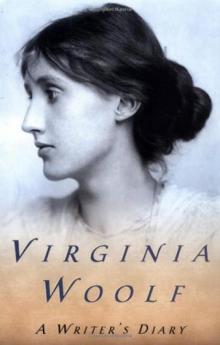 A Writer's Diary: Being Extracts From the Diary of Virginia Woolf
A Writer's Diary: Being Extracts From the Diary of Virginia Woolf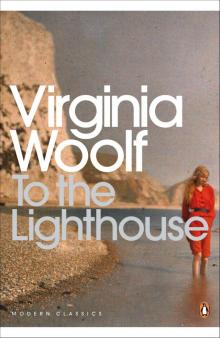 To The Lighthouse
To The Lighthouse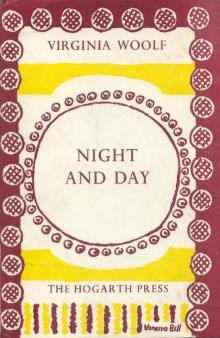 Night and Day
Night and Day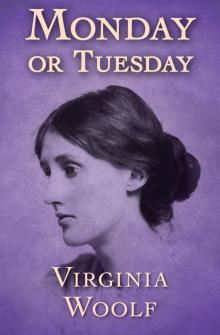 Monday or Tuesday
Monday or Tuesday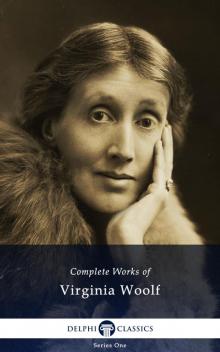 Complete Works of Virginia Woolf
Complete Works of Virginia Woolf Orlando
Orlando Genius and Ink
Genius and Ink Mrs. Dalloway (Annotated)
Mrs. Dalloway (Annotated)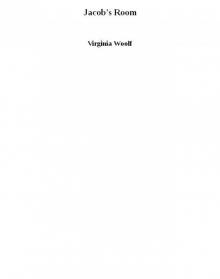 Jacob's Room
Jacob's Room THE RUSSIAN POINT OF VIEW
THE RUSSIAN POINT OF VIEW A Writer's Diary
A Writer's Diary Woolf Short Stories
Woolf Short Stories